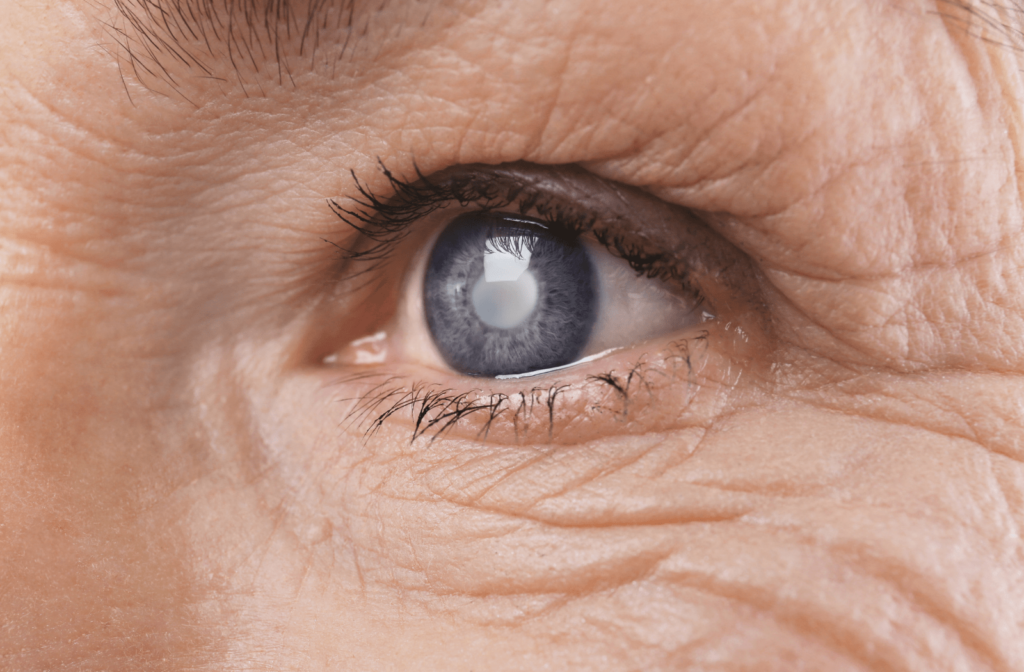Cataracts—among other things—are a common condition your eye doctor checks for when performing a comprehensive eye exam. While cataracts aren’t necessarily a threat to the overall health of the eye, they can severely impact a person’s vision, making normal daily activities more challenging, and making it unsafe to drive a vehicle. An optometrist can detect them long before you realize your vision is changing.
Another benefit to getting eye exams every 1 to 2 years (as recommended by the Canadian Association of Optometrists) is that your eye doctor can also help design a preventative strategy. For example, if you’re at a higher risk of developing cataracts, your eye doctor can advise you on things to aid in prevention.
This article gives an overview of cataracts and their treatment and also explores whether that treatment is always permanent.
What Are Cataracts?
Your eye has a lens that sits behind the pupil and is responsible for focusing light. Over time, this lens (or parts of it) can grow cloudy. At first, many people don’t notice any changes because they’re so gradual. However, the cloudiness can eventually affect your vision.
Symptoms of Cataracts
If you have the recommended number of eye exams, your optometrist will likely discover cataracts before they present any symptoms. However, knowledge is a great way to avoid being blindsided by a change in your vision. So, here are some signs to be mindful of:
- A significant decline in night vision
- Cloudy or blurred vision that doesn’t fluctuate when you blink
- Colours appear faded or dull
- Double vision (this symptom may actually improve as the condition worsens)
- Rapidly changing prescriptions for eyeglasses or contact lenses
- Glare or halos around lights
- Needing more light to read fine print
Risk Factors of Cataracts
Cataracts are most common in aging adults; many people over 80 have them or have had cataract surgery. Age aside, some of the most common risk factors for developing cataracts include:
- Diabetes
- Excessive alcohol consumption
- Previous eye injury
- Eye surgery (even without complications)
- Upper body radiation treatment
- Smoking
- Family history of cataracts
- Steroid medications (even non-ocular-related steroids)
- Excessive UV light exposure
Overview of Cataract Surgery
There’s no way to reverse cataracts once they start growing. However, cataract surgery is a safe, effective procedure that completely removes your cataracts. Once your optometrist detects the cataracts, they can make a timely referral for a surgical consult with an ophthalmologist (eye surgeon).
Cataract surgery involves the ophthalmologist making a tiny incision so small it doesn’t require sutures, and carefully removing the cloudy lens, replacing it with a clear, artificial lens (an intraocular lens or IOL).
The implanted IOL generally features some amount of prescription, which can lessen the need for glasses or contacts after cataract surgery. Your optometrist can discuss all the available IOL options with you before they make the referral to see the surgeon. These include mono-focus, multi-focus, and astigmatism-correcting IOLs.
Is Surgery Necessary?
Cataract surgery is certainly not necessary the moment cataracts are diagnosed. Many can continue their life as normal even as the condition progresses. However, surgery is the only treatment that can remove a cataract. So, once the cataract begins affecting your daily life, then surgery becomes a necessary treatment.
Can Cataracts Return After Surgery?
Because of the nature of the surgery, the original cataracts cannot return because they can’t grow on the artificial lens. However, something called a secondary cataract may develop.
“Secondary cataract” is a bit of a misnomer since it’s not an actual cataract. This condition results from the lens capsule becoming cloudy from posterior capsular opacification (PCO). This is a relatively common “complication” that an ophthalmologist can easily treat for you in-office without additional surgery.
PCO Removal
If the PCO becomes bothersome, it’s possible to treat it with a special laser surgery that usually only takes a few minutes. The ophthalmologist begins by numbing your eye with drops and using the laser to make a tiny opening in the back of the lens.
After the procedure, your doctor will go over any specific aftercare instructions. But typically, you can return to your normal activities quickly after surgery.
Preventing Cataracts
Like any other medical condition, preventing a disease or condition is almost always better than treating it after the fact. While there is no guaranteed way to prevent cataracts from developing, there are certainly some things you can do to reduce your chances of getting them:
- Quit smoking; your entire body will thank you for this one
- Reduce alcohol consumption
- Ensure other health conditions like diabetes are well-managed
- Eat a whole-foods, minimally-processed diet
- Wear sunglasses to prevent UV light exposure
Remember that regular eye examinations are the best way to catch cataracts early.
Learn More About Cataract Surgery
It’s easy to hear the word surgery, especially regarding our eyes, and panic a bit. But cataract surgery has an incredible success rate with minimal complications.
So, if you’re dealing with cataracts, give us a call. The professional staff here at Orchard Park Optometry is available to answer your questions and book an appointment with one of our experienced optometrists. Upon examination, they can determine your eligibility for cataract surgery.




